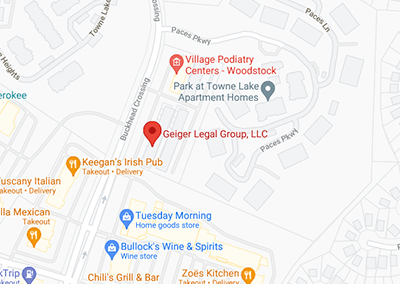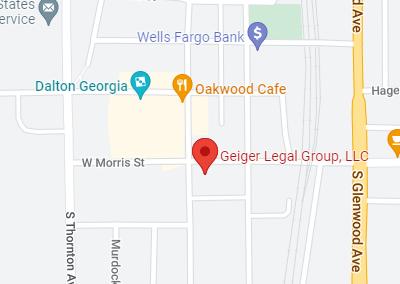Birth Injury Lawyer in Canton, Georgia

All parents want their children to get the best possible start in life. But unfortunately, birth injuries are a common danger that can hamper a child’s development and require expensive, specialized care. Sadly, many children with birth injuries struggle with health problems all their lives, impacting their ability to find work and care for themselves.
While some birth injuries are unavoidable, many results from mistakes by healthcare professionals. If improper medical care caused your child to be hurt, you could hold the at-fault party accountable for their mistake — whether it was a doctor, hospital, or another healthcare provider. The Georgia birth injury attorneys at Geiger Legal Group, LLC in Canton, can help you pursue the compensation you and your child deserve. We have over 40 years of experience helping injured Georgians get the accountability and financial security they deserve for injuries caused by medical malpractice.
Proving medical malpractice can be complex. But our driven team of personal injury attorneys has the skills and resources to aid in your pursuit of justice. Call us today or visit our contact page for a free consultation with one of our birth injury lawyers in Canton, GA.
Types of Birth Injuries
Some of the most common types of birth injuries that can result from medical malpractice include the following:
- Cerebral palsy – Cerebral palsy describes conditions that can affect a newborn’s movement, balance, and posture. In many cases, newborns develop cerebral palsy because they did not get enough oxygen during pregnancy or while the mother was in labor. This may be because a doctor did not order an emergency C-section when appropriate or did not notice signs of fetal distress.
- Brachial plexus palsy (Erb’s palsy) – The brachial plexus is a bundle of nerves near the shoulder that relays signals from the brain and spinal cord to the hands and arms. The brachial plexus can be damaged if a doctor or nurse handles a baby too roughly during delivery or is not careful when using birthing tools like forceps. This can cause the baby to lose the ability to use the affected limb.
- Klumpke’s palsy – Another type of arm injury that can occur during birth is Klumpke’s palsy, which also affects the nerves in the arm. It is often caused by shoulder dystocia, a condition in which a fetus’ arms or shoulders become stuck against the mother’s pelvis or pubic bone during delivery. If a doctor does not order a timely C-section or handles the baby too roughly during delivery, the baby could sustain permanent damage to one or both arms.
- Broken bones – Newborns are incredibly fragile and must be handled delicately during labor and delivery. If a doctor misuses birthing implements or is too rough with the baby, the child could suffer painful bone fractures. In some cases, these fractures can lead to lifelong health issues.
- Brain damage – The most common cause of brain damage among fetuses and newborns is a lack of oxygen to the brain during pregnancy or delivery. Doctors should carefully monitor a fetus’ oxygen levels throughout pregnancy and labor, or the child could suffer lifelong physical and mental health effects. Physical trauma or improper use of birthing tools can also impact oxygen flow to a fetus’ brain.
Georgia Birth Injury Statistics
Unfortunately, few publicly available statistics show how common birth injuries are in Georgia or the broader United States. One study from the Agency for Healthcare Research and Quality found nearly 158,000 potentially avoidable birth injuries to mothers and newborns in the United States in the year surveyed. Given there were about 4.3 million births in community hospitals nationwide that year, the study suggests that nearly 4 percent of all births involved some injury to the child or mother.
More recently, the medical database StatPearls published a report on birth injuries. They noted that birth trauma rates had declined from about 2.6 per 1,000 live births to about 1.9 per 1,000 live births over the eight years studied by the authors.
Most Common Causes of Birth Injuries
While there are some cases where nothing can be done to prevent a birth injury, many are caused by some form of error on the part of the delivering doctor, such as:
- Not recognizing signs of fetal distress and acting accordingly
- Inaccurately interpreting the result of a fetal ultrasound
- Failure to speed up delivery or order an emergency C-section when appropriate
- Improper use of birthing tools, such as vacuums or forceps
- Improper use of drugs that can induce or speed up delivery, such as Pitocin
- Failure to properly care for or resuscitate a baby after delivery
Time Limit to File a Birth Injury Lawsuit
The standard time limit to file a medical malpractice lawsuit in Georgia is two years from the date of the injury or the date the damage was discovered, depending on the circumstances of the case. However, the statute of limitations in a birth injury case differs slightly.
Georgia law says parents of children who are injured due to medical malpractice and are younger than age five have until the child reaches age seven to file a lawsuit. While this extended deadline gives you more time to build your case, you should still speak to a lawyer as soon as possible to avoid any issues with the statute of limitations.
Hiring a Birth Injury Lawyer in Canton, GA
If your child was injured as the result of improper medical care, your family should be compensated for losses such as:
- The cost of your child’s past and future medical care
- Any income you lost due to you or your child having to be hospitalized
- Your pain and suffering, as well as your child’s pain and suffering
- Any psychological or emotional distress suffered by you or your child
Unfortunately, getting this compensation can only be easy with the help of an experienced birth injury lawyer in Canton, GA. That’s why you should contact Geiger Legal Group, LLC today. We offer free consultations, so it won’t cost you anything to learn about your options for pursuing justice and accountability for your child.


















